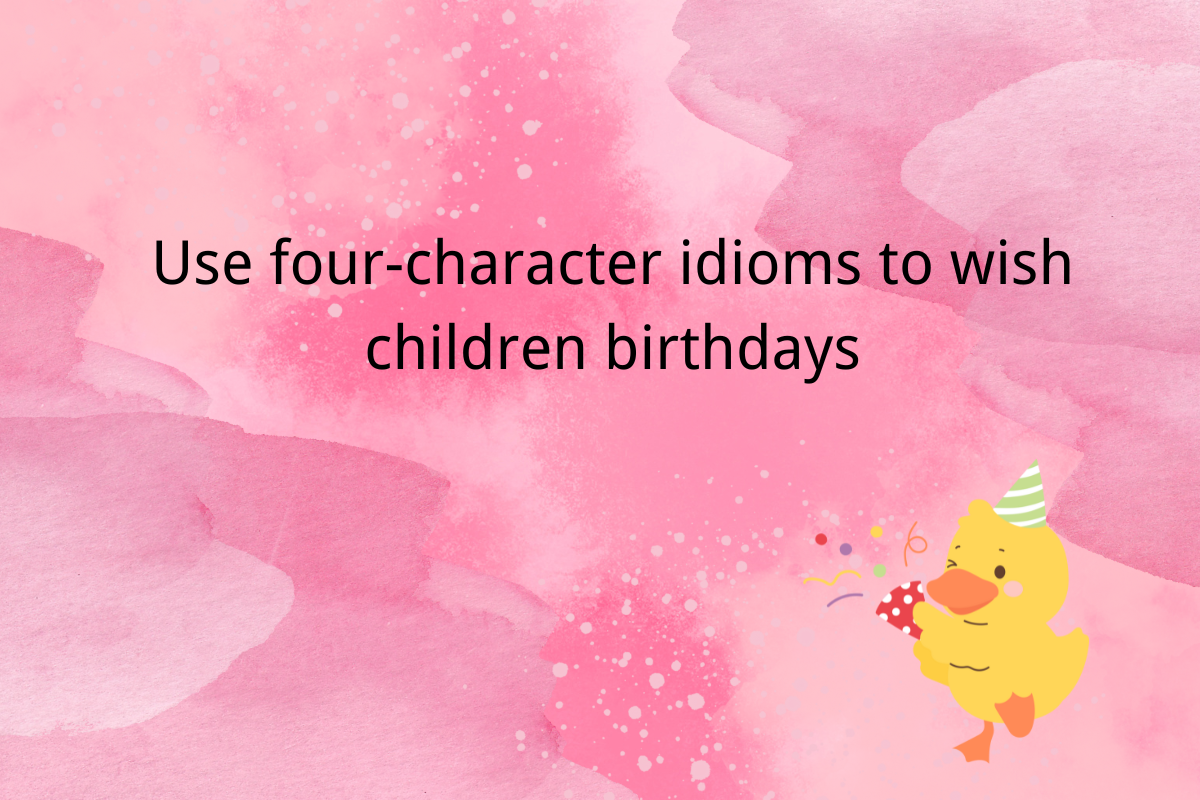Use Four-Character Idioms to Wish Children Birthdays (Part 2)
In children's lives, birthdays are one of the most anticipated days of the year. For them, it not only means growing a year older but also a moment of joyous celebration with family and friends gathered around them. On this special day, children can indulge in delicious food, playtime, and laughter, with one highlight being the birthday idioms game. Birthday idioms games not only allow children to learn idioms while playing but also add fun and vibrancy to the party. Today, let's explore some birthday idioms games suitable for children's birthday parties, adding more joy and educational value to the celebrations!

Huān Lè Wú Yōu (欢乐无忧): Joy without Worries
Background
In ancient times, a wealthy family held a grand celebration to commemorate their child's birthday. The entire festivity was lively, with relatives and friends gathering together, music and dance in abundance, and laughter echoing throughout. This celebration, described as "joy without worries," illustrated people's longing for a happy and fulfilling life.
Why Chinese People Like this Idiom
In Chinese culture, people aspire to lead happy and content lives. The idiom "huān lè wú yōu" vividly expresses this aspiration, symbolizing the desire 欲望 (yù wàng) for a life filled with laughter and devoid of worries. Therefore, this idiom is beloved by Chinese people and often used to convey blessings for others to lead a joyful and carefree life.
欲望 (yù wàng), noun, desire
Examples:
- I have a strong desire to travel the world.
我有强烈的欲望去环游世界。
wǒ yǒu qiángliè de yù wàng qù huányóu shìjiè. - Her desire for success drives her to work hard every day.
她对成功的欲望驱使她每天努力工作。
tā duì chénggōng de yùwàng qūshǐ tā měitiān nǔlì gōngzuò.

Wú Yōu Wú Lǜ (无忧无虑): Carefree and Worry-Free
Background
This idiom originates from a story depicting a harmonious family where children grow up under the loving care of their parents, free from any worries. They play freely at home, happily enjoying each day. This narrative vividly portrays a carefree and worry-free state of mind.
Why Chinese People Like This Idiom
Chinese people value family and the happiness of children, hoping for their carefree and joyful growth. The idiom "wú yōu wú lǜ" aptly expresses this desire for children to lead a life without worries 担忧 (dān yōu), thus earning popularity and frequent usage among the Chinese.
担忧 (dān yōu), noun, worries
Examples:
She has many worries about her upcoming exam.
她对即将到来的考试有很多担忧。
tā duì jí jiāng dào lái de kǎo shì yǒu hěn duō dān yōu.
My grandmother always listens to my worries and gives me advice.
我奶奶总是倾听我的担忧,并给我建议。
wǒ nǎi nǎi zǒng shì qīng tīng wǒ de dān yōu, bìng gěi wǒ jiàn yì.
Key Sentences:
Today's birthday party was full of joy without limits, and everyone had a great time.
今天的生日派对真是欢乐无边,大家都玩得很开心。
Jīntiān de shēngrì pàiduì zhēn shì huān lè wú biān, dàjiā dōu wán de hěn kāixīn.
The children played carefree and worry-free on the beach.
孩子们在沙滩上玩得无忧无虑。
Háizimen zài shātān shàng wán de wú yōu wú lǜ.
During the holidays, I always live a carefree and worry-free life.
放假的日子里,我总是过得很无忧无虑。
Fàngjià de rìzi lǐ, wǒ zǒng shì guò de hěn wú yōu wú lǜ.